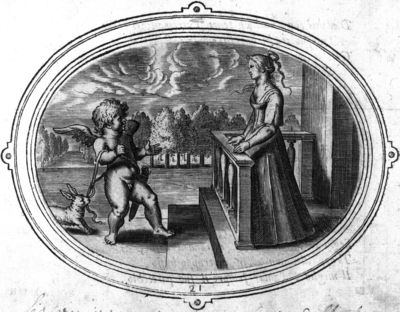Primos aditus difficiles habet [21]

Translations
 |
Het eerste begin is moeilijk. [cf. Ovidius, Remedia amoris 120 Difficiles aditus impetus omnis habet.] |
 |
Beginnings are difficult. [cf. Ovidius, Remedia amoris 120 Difficiles aditus impetus omnis habet.] |
Literature
- Sebastiàn, Lectura crítica
 , p. 22
, p. 22
Sources and parallels
- Primos aditus difficiles habet [15] (in: Otto Vaenius, Emblemata aliquot selectiora amatoria (1618))
[Compare
![Compare [compare]](/static/images/compare2.gif) ]
]
- Ayres, Emblemata amatoria
 , embl. 4
, embl. 4 -
May have provided background scene for: Zy brandt en beeft [13] (in: Pieter Cornelisz. Hooft, Emblemata amatoria (1611))
[Compare
![Compare [compare]](/static/images/compare2.gif) ]
]
-
Same motto, pictura slightly modified, different subscriptio, different number of women: Primos aditus difficiles habet. [4] (in: anonymous, Emblemata amatoria (1690))
[Compare
![Compare [compare]](/static/images/compare2.gif) ]
]
-
Buschoff 2004, p. 118. Background of the pictura had its influence on:Zy brandt en beeft [13] (in: Pieter Cornelisz. Hooft, Emblemata amatoria (1611))
[Compare
![Compare [compare]](/static/images/compare2.gif) ]
]
References, across this site, to this page:
- Primos aditus difficiles habet. [4] (in: anonymous, Emblemata amatoria (1690))
- Zy brandt en beeft [13] (in: Pieter Cornelisz. Hooft, Emblemata amatoria (1611))
- Zy brandt en beeft [13] (in: Pieter Cornelisz. Hooft, Emblemata amatoria (1611))
- Zy brandt en beeft [13] (in: Pieter Cornelisz. Hooft, Emblemata amatoria (1611))
- Primos aditus difficiles habet [15] (in: Otto Vaenius, Emblemata aliquot selectiora amatoria (1618))
Iconclass
A cupid, followed by a hare, faces a woman- rodents: hare (+ animal(s) pulling, drawing something)
[25F26(HARE)(+5247)]

- one-sided courting
[33C31]

- terrace
[41A351]

- proposal, declaration of love (+ variant)
[42D11(+0)]

- quiver
[45C23]

- tools, aids, implements ~ crafts and industries: rope
[47D8(ROPE)]

- Hope; 'Speranza', 'Speranza delle fatiche' (Ripa) (+ emblematical representation of concept)
[56D1(+4)]

- Fear, Dread; 'Paura', 'Timidité o Timore', 'Timore' (Ripa) (+ emblematical representation of concept)
[56DD1(+4)]

- (personifications and symbolic representations of) Love; 'Amore (secondo Seneca)' (Ripa) (+ emblematical representation of
concept)
[56F2(+4)]

- proverbs, sayings, etc. (with TEXT)
[86(PRIMOS ADITUS DIFFICILES HABET)]

- other non-aggressive activities of Cupid
[92D156]

- attributes of Cupid (with NAME)
[92D18(QUIVER)]

![[H O M E : Emblem Project Utrecht]](/static/images/rd-small.gif)


















































































































































